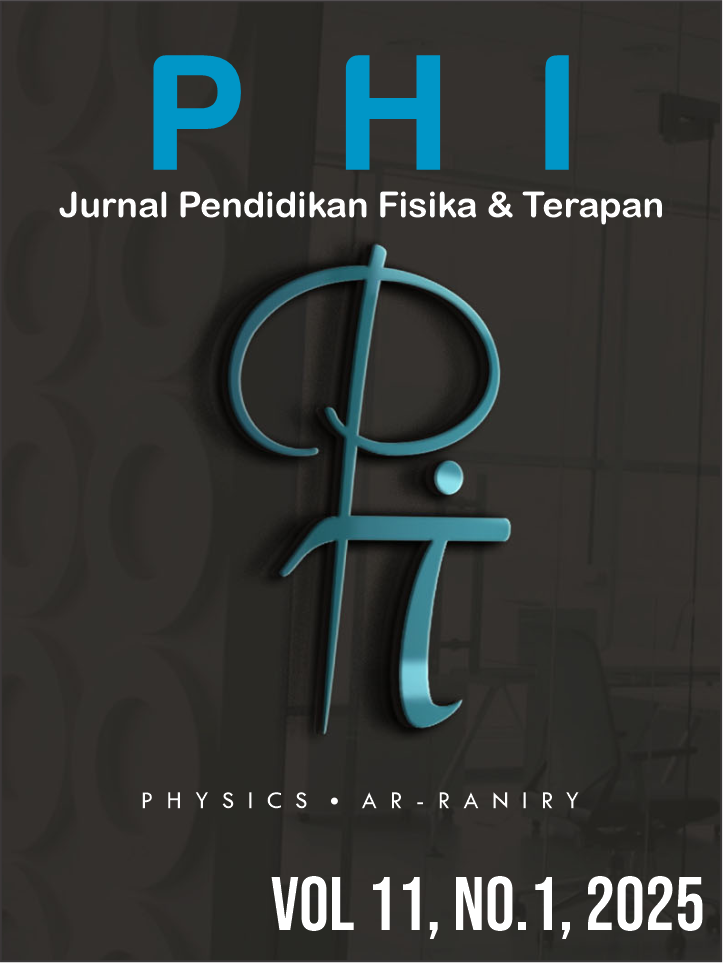The Effectiveness of The Implementation of The Independent Curriculum Based on TPACK on The Conceptual Understanding of High School Students on Momentum and Impulse Material
DOI:
https://doi.org/10.22373/p-jpft.v11i1.28107Keywords:
Kurikulum Merdeka, TPACK, Pemahaman KonseptualAbstract
This study explores the implementation of Merdeka Curriculum through the Technological Pedagogical and Content Knowledge (TPACK) approach to improve senior high school students' conceptual understanding of momentum and impulse. Merdeka Curriculum emphasizes innovative and flexible learning, but its practical application in improving students' conceptual knowledge, especially in physics, remains unexplored. thus highlighting the need for teaching strategies that integrate technology, pedagogy, and content effectively. This research was conducted at SMA Nurul Iman Tanjung Morawa with class XI MIA 1 as the experimental group and XI MIA 2 as the control group. A quasi-experimental design with non-equivalent control groups was used, where the experimental group received instruction using the TPACK approach, while the control group followed conventional teaching methods. Data analysis using SPSS version 25 showed that the experimental group achieved a mean score of 71.42 (71%), compared to 62.29 (62%) for the control group. These results indicate that the implementation of TPACK-based curriculum is effective in improving students' conceptual understanding. Statistical analysis yielded a significance value of 0.037 (<0.05), which confirmed the success of the approach. Thus, this study concludes that the implementation of the TPACK-based Merdeka Curriculum effectively improves senior high school students' conceptual understanding of momentum and impulse.References
Agyei, D. D., & Voogt, J. (2012). Developing technological pedagogical content knowledge in pre-service mathematics teachers through collaborative design. Australasian Journal of Educational Technology, 28(4), 547–564. https://doi.org/10.14742/ajet.827
Arikunto, S. (1998). Prosedur Penelitian Suatu Pendekatan Praktek. PT Rineka CIpta.
Etikamurni, D. P., Istyowati, A., & Ayu, H. D. (2023). Upaya Peningkatan Motivasi Belajar Fisika Melalui Discovery Learning-Berdiferensiasi di Era Kurikulum Merdeka. Jurnal Terapan Sains & Teknologi Rainstek, 5(2), 180–189. ejournal.unikama.ac.id/index.php/jtst
Handal, B., Campbell, C., Cavanagh, M., Petocz, P., & Kelly, N. (2013). Technological Pedagogical Content Knowledge of Secondary Mathematics Teachers. Contemporary Issues in Technology and Teacher Education, 13(1), 22–40. http://www.citejournal.org/vol13/iss1/mathematics/article1.cfm
Hartoyo, A., & Rahmadayanti, D. (2022). Potret Kurikulum Merdeka, Wujud Merdeka Belajar di Sekolah Dasar. Jurnal Basicedu, 5(4), 2247–2255. https;//jbasic.org/index.php/basicedu
Mardiana, N., Mardiani, N., Fitriana, S., Husna, M., & Rizaldi, R. (2020). The Impact of Problem Solving Method to Improve the Critical Thinking and Science Process Skills in Physics. Icmr 2018, 512–518. https://doi.org/10.5220/0008889805120518
Mardiana, N., Prayogi, S. Y., Sukartika, Haslima, S., & Md, H. (2022). Android-Based Digital Teaching Materials as Online Learning in New Normal Era to Improve Physics HOTS for High School Students. Journal of Natural Science and Integration, 5(1), 90–95. https://doi.org/10.24014/jnsi.v4i2.11445
Maulida, U. (2022). Pengembangan Modul Ajar Berbasis Kurikulum Merdeka. Tarbawi, 5(2), 130–138.
Puspitasari, L., Astuti, B., & Masturi, M. (2020). Penerapan Project Based Learning (PjBL) Terbimbing untuk Meningkatkan Keaktifan dan Pemahaman Siswa pada Konsep Momentum, Impuls, dan Tumbukan. Physics Education Research Journal, 2(2), 69. https://doi.org/10.21580/perj.2020.2.2.4959
Rahayu, R., Rosita, R., Rahayuningsih, Y. S., Hernawan, A. H., & Prihantini. (2022). Implementation of Independent Curriculum in Driving School. Jurnal Basicedu, 6(4), 6313–6319.
Rahimah. (2022). Peningkatan Kemampuan Guru SMP Negeri 10 Kota Tebingtinggi dalam Menyusun Modul Ajar Kurikulum Merdeka. Jurnal Ansiru PAI, 6(1), 92–106.
Relia, A., & Sodikin. (2018). Pengaruh Pembelajaran Guided Discovery Berbantu Laboratorium Virtual Terhadap Pemahaman Konsep Siswa pada Materi Momentum dan Impuls. Indonesian Journal of Science and Mathematics Education, 01(2), 13–21.
Sa’diyah, H., & Sunarsih, A. (2021). Analisis Kesulitan Belajar Siswa pada Materi Elastisitas dan Getaran Harmonik dalam Pembelajaran Fisika Berbasis Inkuiri di Sekolah Menengah Atas. Jurnal Pendidikan IPA Dan Keilmuan, 01(01), 7–11.
Setiawati, N., Studi, P., & Fisika, P. (2022). Analisis Implementasi Kurikulum Prototipe Pada Mata Pelajaran Fisika Sma Pelaksana Program Sekolah Penggerak Di Kabupaten Ogan Komering Ulu Timur Skripsi.
Sugih, S. N., Maula, L. H., & Nurmeta, I. K. (2023). Implementasi Kurikulum Merdeka dalam Pembelajaran IPAS di Sekolah Dasar. Jurnal Pendidikan Dasar Flobamorata, 4(2), 599–603. https://doi.org/10.51494/jpdf.v4i2.952
Suseno, N. (2014). Pemetaan Analogi Pada Konsep Abstrak Fisika. Jurnal Pendidikan Fisika, 2(2). https://doi.org/10.24127/jpf.v2i2.118
Warsidah, W., Satyahadewi, N., Amir, A., Linda, R., & Mulya Ashari, A. (2022). Implementasi Pembelajaran Berbasis Kurikulum Merdeka pada Peserta Didik Kelas 4 Sekolah Dasar Negeri No 16 Pontianak Utara. AR-RIAYAH : Jurnal Pendidikan Dasar, 6(2), 233. https://doi.org/10.29240/jpd.v6i2.5519
Yunus, N. H., Andriani, & Masnur. (2023). Efektivitas Implementasi Kurikulum Merdeka dengan Penerapan Model Project Based Learning terhadap Keterampilan Menulis Teks Biografi. 5, 341–345. https://doi.org/10.35329/jp.v5i2.4719
Downloads
Published
Issue
Section
License
Authors who publish with Jurnal Phi agree to the following terms:
- Authors retain copyright and grant the journal right of first publication with the work simultaneously licensed under a Creative Commons Attribution License (CC BY 4.0) that allows others to share the work with an acknowledgment of the work's authorship and initial publication in this journal.
- Authors are able to enter into separate, additional contractual arrangements for the non-exclusive distribution of the journal's published version of the work (e.g., post it to an institutional repository or publish it in a book), with an acknowledgment of its initial publication in this journal.
- Authors are permitted and encouraged to post their work online (e.g., in institutional repositories or on their website) prior to and during the submission process, as it can lead to productive exchanges, as well as earlier and greater citation of published work (See The Effect of Open Access).

















